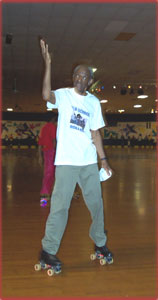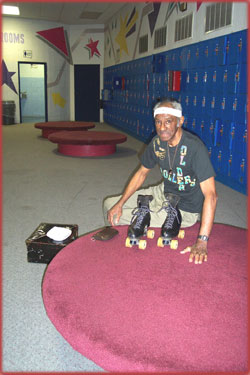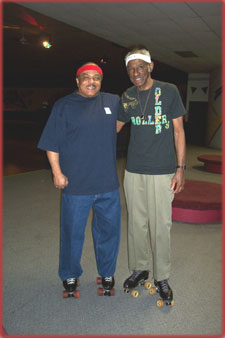

A SkateGroove Publication
Volume I Issue I
 The Roller Skating "Great Great Grand Daddy" of Cincinnati |
You will find Mr. Norman on Wednesday and Sunday nights at Golden Skates and Thursdays at the Rink Fun Factory both in Cincinnati, OH. If you don't know who he is, believe me, he is not hard to spot. He will be the grey-haired gentleman who will roll next to you with a flowing grace, arms spread apart, welcoming you to "his world" as he speaks to you with a nodding smile. I arrived at Golden Skates early one Sunday evening and sat down with Mr. Norman to talk to him about his life and skating. While we were talking, the song "Happy Feeling" by Maze featuring Frankie Beverly, came on and he immediately went into his skate zone, you know, that zone we all get in when we hear a song that we simply love to skate to. "Now that is music" Carr exclaims as he begins to dance with his hands, flowing to the tune. "I remember back in the 1950's when we used to skate at the Ritz in Downtown Cincinnati, on the corner of Court and Central. It was on the third floor of the old Greystone Ballroom. My father and brother started that rink. The floor wasn't all that great. It had poles in the middle of it for support. We only had the rink for about two or three years. They ventured off into other things and I was left managing the rink." Carr served in the United States Navy from 1944-1946, right after World War II. When he returned to Cincinnati, he worked in a foundry for 40 years, molding and making machine tools before he retired. One thing he will never retire from is skating. He has been patronizing Golden Skates for twenty-two years and the Fun Factory for ten years. He doesn't care what kind of music he skates to as long as it has a beat. Old School, New School, Jazz, Gospel, Hip Hop - whatever, he is happy and he is rolling. Not only is he skilled at his craft, he is also skilled at repairing skates and inventing new ways to upgrade his skates by adding lights or some other fancy idea that makes him shine on the skate floor just that much more. I asked Mr. Norman if he ever traveled to other skating rinks. Like many of us, the answer was yes, but his travels have not been that far away. He mainly travels to Midwestern cities like Chicago, Cleveland, Indianapolis, Detroit and up Interstate 75 to Dayton. Mr. Norman
is a legacy in his own right. He started | They bring their schoolmates to the rink and they are so proud to see me skate. Now I am a great-great grandfather of many. I skated with my kids, my grandchildren, my great grandchildren and now my great-great grandchildren and they love it. are so proud to see me skate. They say 'That's my great grand dad out there skating!'." The seventy-year era of skating has not gone without racial trouble. "Back in those days, we were not allowed to skate at the nice roller rink on Gilbert Avenue", he says. "For forty years, African Americans could not skate there. The owner even put in his will that he never wanted any "black" persons to skate there." The owner eventually died and the stipulations of his will were honored. For that reason, the building sat empty for twenty years. When it did reopen in the seventies, the rink saw action again. African Americans were allowed to skate but they could not wear the rental skates. They had to use their own skates. The racial discrimination that he and others like him in his time endured has made an impact on many peoples lives and many of them don't even realize it. Back then, they would protest and stand up for their rights, not letting anything stand between them and their passion for skating.
Mr. Norman and his buddy Yuhana, have been coming to the rink together for many years. They used to have a couple of friends that would join them but they chose to retire from the sport. I asked "What keeps you skating? What keeps you going? Where do you get so much energy?" Mr. Norman exclaimed "Skating is Therapy!" Indeed it is - both physical and mental. "Skating is an exercise for both your body and your mind." He is not on any special diet nor does he have any no physical limitations or ailments that generally come along with age. An excellent skater he is indeed. He turns, twists, spins, skates sideways and everything else. He has the balance and grace of a professional. His advice is to do what you are capable of, get that down and then graduate to the rest, all of the time improving. Then you can excel. Mr. Norman use to skate to live organ music, waltz, skate in the opposite direction, moonlight couple and advance skate. Monica Smith, a fellow Cincinnati skater asked him "What is Advance Skating?" Mr. Norman chuckled and said, "It is when there is a line of skaters, and the whistle blows, then you advance to the first person in line and dance (skate) with them." Mr. Norman agrees that skating is competitive and rewarding. He feels he is rewarded when he can help others succeed. He loves to share his expertise with fellow skaters and overall, it is good clean fun. Written by: Desi With excerpts from Monica Smith Edited by: Khannie Butler October
2002 |
 On June 17, 1925,
a skater for life was born in Cincinnati, Ohio. Seventy-seven years and rollin',
Norman Carr, respectfully addressed as "Mr. Norman by the younger generation of
Cincinnati Skaters, is still rolling three times weekly and loving it.
On June 17, 1925,
a skater for life was born in Cincinnati, Ohio. Seventy-seven years and rollin',
Norman Carr, respectfully addressed as "Mr. Norman by the younger generation of
Cincinnati Skaters, is still rolling three times weekly and loving it.  "street skating" when he was seven years old, using skates that clamped to shoes
called "Iron Busters". Eventually, his father made a pair of skates for him from
a pair of old boots. Mr. Norman, like many dedicated skaters, passed his passion
down through his family. He has four children, three boys and one girl (all adults
now of course). When his two boys were 4 and 5 years old, he took them to the
rink and taught them how to skate. "Back then, they didn't have skates readily
available in children's sizes so I had to be creative and make skates for my sons
just as my father did for me.
"street skating" when he was seven years old, using skates that clamped to shoes
called "Iron Busters". Eventually, his father made a pair of skates for him from
a pair of old boots. Mr. Norman, like many dedicated skaters, passed his passion
down through his family. He has four children, three boys and one girl (all adults
now of course). When his two boys were 4 and 5 years old, he took them to the
rink and taught them how to skate. "Back then, they didn't have skates readily
available in children's sizes so I had to be creative and make skates for my sons
just as my father did for me.